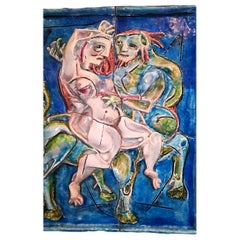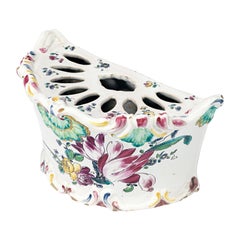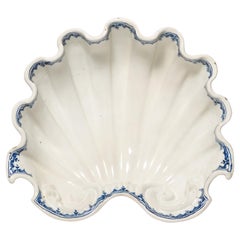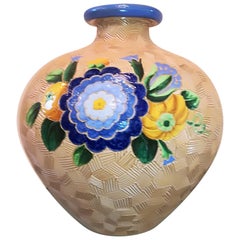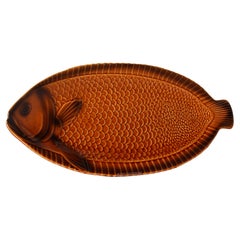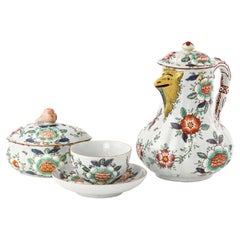Maiolica Furniture
to
24
134
13
141
7
1
29
26
7
6
6
4
4
2
1
1
82
30
29
8
9
15
5
4
2
2
3
3
1
4
152
355,170
295,375
224,794
150,277
144
115
14
8
3
149
148
148
12
10
9
6
4
Material: Maiolica
Bas Rilief, 1950 Germano Belletti
Located in Milano, IT
Exceptional and exclusive Bas Rilief, 1950 Germano Belletti " Centauri" in Faenza, 1914 works with Pietro Melandri, Riccardo Gatti, Mario Morelli. Apprezzated to Giò Ponti.
Category
1950s Italian Other Vintage Maiolica Furniture
Materials
Maiolica, Wood
Ancient Maiolica Flower Pot Pasquale Rubati Factory, Milan Circa 1770
Located in Milano, IT
Maiolica flower pot “a mezzaluna” decorated with tulip
Pasquale Rubati Factory
Milan, circa 1770.
Measures: 4.7 in x 4.7 in x 8.6 in
12 cm x 12...
Category
1770s Italian Rococo Antique Maiolica Furniture
Materials
Maiolica
Ancient Italian Maiolica Faenza, Ferniani Factory, Circa 1700
Located in Milano, IT
Centerpiece white maiolica shell
Ferniani factory, early period: 1693-1776
Faenza, circa 1700
Measures: 5.6 in x 14.72 in x 13.46 in (14.3 cm x 37.4...
Category
Early 1700s Italian Baroque Antique Maiolica Furniture
Materials
Maiolica
Vase 'Pot' 1930, Multi-Color Round Shape, Majolica, Giò Ponti
Located in Milano, IT
GIO PONTI -VASE of Majolica 1930, signed Ginori model 3130, accompanied by the authentic certiate from Gio' Ponti Archives.
Category
1930s Italian Art Deco Vintage Maiolica Furniture
Materials
Maiolica
$8,416 Sale Price
40% Off
huge French Majolica Fish Platter Sarreguemines 1950s in very good condition
Located in Landshut, BY
huge French Majolica Fish Platter
Sarreguemines 1950s
in very good condition
German : Saargemünd / French Sarreguemines) is situated in the north-east of France, on the border wi...
Category
Mid-20th Century German Maiolica Furniture
Materials
Maiolica
Ancient Maiolica Coffee Set “Barbotine” Decoration Milan, 1770- 1780
Located in Milano, IT
Coffee assortment with “barbotine” decoration
Manufacture of Pasquale Rubati or Felice Clerici
Milan, 1770- 1780
Maiolica polychrome decorated “a piccolo fuoco” (third fire).
...
Category
1770s Italian Rococo Antique Maiolica Furniture
Materials
Maiolica
Ancient Pair Coffee Pots, Pasquale Rubati Manufacture Milan, 1770 circa
Located in Milano, IT
Pair of small coffee pots.
Manufacture of Pasquale Rubati
Milan, 1770 Circa
Maiolica polychrome decorated “a piccolo fuoco” (third fire).
a) height 7.87 x 5.51 x 3.93 in (20 x 14 x ...
Category
1760s Italian Neoclassical Antique Maiolica Furniture
Materials
Maiolica
Italian Maiolica Pharmacy Flasks Felice Clerici, Milan Circa 1770-1780
Located in Milano, IT
Two maiolica pharmacy flasks
Milan, Felice Clerici Manufacture, 1770-1780
They each measure 9.44 in (24 cm) in height x 6.10 in (15.5 cm) in diameter
l...
Category
1770s Italian Neoclassical Antique Maiolica Furniture
Materials
Maiolica
Ancient Italian Assortment Coffe Pot and Cups, Lodi, Circa 1765-1770
Located in Milano, IT
A coffee pot and two cups with saucers
Antonio Ferretti Manufacture
Lodi, Circa 1765-1770
Maiolica polychrome decorated “a piccolo fuoco” (third fire).
They measure:
coffee pot: 9....
Category
1760s Italian Rococo Antique Maiolica Furniture
Materials
Maiolica
Ancient Maiolica Cup, Rubati Manufacture, Milan, Circa 1770 - 1780
Located in Milano, IT
Sick cup
Pasquale Rubati Manufacture
Milan, Circa 1770 - 1780
Maiolica decorated in polychrome “a piccolo fuoco” (third fire)
It measures: h 2.36 x 7.4 x 7.87 (h 6 x 19 x 20 cm)
...
Category
1770s Italian Rococo Antique Maiolica Furniture
Materials
Maiolica
Italian Maiolica Ancient Sugar Bowl, Lodi, 1770-1780
Located in Milano, IT
Maiolica sugar bowl
Antonio Ferretti Manufacture
Lodi, Circa 1770-1780
Maiolica polychrome decorated “a piccolo fuoco” (third fire).
It measures 3.54 x 4.52 x 3.54 in (9 x 11,5 x 9 cm)
Weight: 0.394 lb (0.179 kg)
State of conservation: small and slight chips on the edges.
The small sugar bowl has a swollen and ribbed body resting on a flat base. The cap-shaped lid follows the rib of the container and is topped with a small knob in the shape of a two-colored fruit.
The sugar bowl is painted “a piccolo fuoco” (third fire) with the characteristic floral motif of bunches and isolated semis.
An example which closely corresponds to this one is kept at the Civic Museum in Lodi (G. Gregorietti, Maioliche di Lodi, Milano e Pavia, Catalogo della Mostra, Milano, 1964 n. 137).
This decorative style represented a strong point of the Lodi factory, which established itself thanks to the vivid nature of the colors made possible by the introduction of a new technique perfected by Paul Hannong in Strasbourg and later introduced by Antonio Ferretti to Italy. The production process, called “piccolo fuoco” (third fire), allowed the use of a greater number of colors than in the past; in particular, the purple of Cassius, a red made from gold chloride, was introduced. Its use allowed for many more tones and shades, from pink to purple.
The Ferretti family started their maiolica manufacturing business in Lodi in 1725.
The forefather Simpliciano started the business by purchasing an ancient furnace in 1725 and, indeed, we have evidence of the full activity of the furnaces starting from April of the same year (Novasconi-Ferrari-Corvi, 1964, p. 26 n. 4). Simpliciano started a production of excellence also thanks to the ownership of clay quarries in Stradella, not far from Pavia. The production was so successful that in 1726 a decree of the Turin Chamber came to prohibit the importation of foreign ceramics, especially from Lodi, to protect internal production (G. Lise, La ceramica a Lodi, Lodi 1981, p. 59).
In its initial stages, the manufacture produced maolicas painted with the “a gran fuoco” (double fire) technique, often in turquoise monochrome, with ornamentation derived from compositional modules in vogue in Rouen in France. This was also thanks to the collaboration of painters like Giorgio Giacinto Rossetti, who placed his name on the best specimens next to the initials of the factory.
In 1748 Simpliciano made his will (Gelmini, 1995, p. 30) appointing his son Giuseppe Antonio (known as Antonio) as universal heir. After 1750, when Simpliciano passed away, Antonio was directly involved in the maiolica factory, increasing its fortunes and achieving a reputation on a European level. Particularly important was the aforementioned introduction in 1760 of the innovative “a piccolo fuoco” (third fire) processing, which, expanding the ornamental repertoire with Saxon-inspired floral themes, was able to commercially compete with the German porcelains that had one of its most renowned offerings in the naturalistic Deutsche Blumen. Antonio Ferretti understood and promoted this technique and this decoration, proposing it in a fresher and more corrective version, less linked to botanical tables, both with or without contour lines, as well as in purple or green monochrome. After efforts to introduce more industrial production techniques to the sector succeeded, even the Ferretti manufacture, in the last decade of the eighteenth century, started heading towards decline despite its attempts to adapt production to neoclassical tastes.
In 1796 the Napoleonic battle for the conquest of the Lodi bridge over the Adda definitively compromised the furnaces. Production resumed, albeit in a rather stunted manner, until Antonio's death on 29 December 1810. (M. L. Gelmini, pp. 28-30, 38, 43 sgg., 130-136 (for Simpliciano); pp. 31 sgg., 45-47, 142-192 (for Antonio).
Bibliography
G. Gregorietti, Maioliche di Lodi Milano e Pavia Catalogo della Mostra, Milano, 1964 n. 137;
C. Baroni, Storia delle ceramiche nel Lodigiano, in Archivio storico per la città e i comuni del circondario e della diocesi di Lodi, XXXIV (1915), pp. 118, 124, 142; XXXV (1916), pp. 5-8;
C. Baroni, La maiolica antica di Lodi, in Archivio storico lombardo, LVIII (1931), pp. 453-455;
L. Ciboldi, La maiolica lodigiana, in Archivio storico lodigiano, LXXX (1953), pp. 25 sgg.;
S. Levy, Maioliche settecentesche lombarde e venete, Milano 1962, pp. 17 sgg.;
A. Novasconi - S. Ferrari - S. Corvi, La ceramica lodigiana, Lodi 1964, ad Indicem; Maioliche di Lodi, Milano e Pavia (catal.), Milano 1964, p. 17;
O. Ferrari - G. Scavizzi, Maioliche italiane del Seicento e del Settecento, Milano 1965, pp. 26 sgg.;
G. C. Sciolla, Lodi. Museo civico, Bologna 1977, pp. 69-85 passim; G. Lise, La ceramica a Lodi, Lodi 1981;
M. Vitali, in Storia dell'arte ceramica...
Category
1770s Italian Rococo Antique Maiolica Furniture
Materials
Maiolica
Torquato Castellani Majolica Renaissance Revival Tin-Glazed Charger
Located in Bishop's Stortford, Hertfordshire
An exceptional Renaissance Revival Maiolica tin-glazed plate painted with a side profile portrait of a lady within a decorative border with a line painted design to the base. The lig...
Category
1880s Italian Renaissance Revival Antique Maiolica Furniture
Materials
Earthenware, Maiolica
Important 19th Century Italian Parade Plate
Located in Madrid, ES
Important 19th Century Italian Parade Plate
Polychrome ceramic, with a wide brim, short frill, and a wide base. Reverse with ring support. Decoration on the rim with harpies and fan...
Category
Early 19th Century Italian Baroque Antique Maiolica Furniture
Materials
Maiolica, Porcelain
Coppia di specchierine veneziane in maiolica del Settecento
Located in Vicenza, IT
Questa bellissima coppia di specchierine in maiolica furono realizzate in Veneto nel XVIII secolo.
Hanno cornice sagomata in maiolica bianca con fiori arricchiti da dorature.
Alla b...
Category
Mid-18th Century Italian Louis XV Antique Maiolica Furniture
Materials
Ceramic, Maiolica, Porcelain
Vassoi di Maiolica 1770 Decoro Mazzolino Verde Manifattura Ferniani Faenza
Located in Milano, MI
Coppia Di Vassoi in maiolica italiana Con Decoro Al Mazzolino Verde Manifattura Ferniani Fine 1700 entrambi mostrano un ampio cavetto liscio, apodo, larga tesa, lievi costolature e o...
Category
1770s Italian Baroque Antique Maiolica Furniture
Materials
Maiolica
Coppia di Mensole Italiane XIX Secolo in Legno Dorato e Maiolica Barocca 1700s
Located in Milano, MI
Due Mensole Antiche Dorate italiane del XIX secolo centrate da Maiolica del 1700, piccole mensole sagomate in legno intagliato e dorato, realizzate con un coperchio in maiolica polic...
Category
Mid-19th Century Italian Baroque Antique Maiolica Furniture
Materials
Maiolica, Giltwood
Cinque Piatti di Maiolica Italiana Faenza Secolo XVIII Decoro Floreale Blu
Located in Milano, MI
Cinque Piatti Sagomati Del 1700 con una decorazione floreale sul bordo. Gruppo di cinque piatti in maiolica, manifattura faentina del secolo XVIII, corpo ovale dal bordo orlato, con ...
Category
18th Century and Earlier Italian Baroque Antique Maiolica Furniture
Materials
Maiolica
Italian Cantagalli Maiolica Large Plate with family noble emblem, Late 19th C.
By Cantagalli
Located in CH
Cantagalli Maiolica Plate with Heraldic Emblem
Cantagalli Factory, Florence, Late 19th Century
Tin-glazed earthenware (maiolica); polychrome decoration
This large maiolica plate was...
Category
Late 19th Century Italian Renaissance Revival Antique Maiolica Furniture
Materials
Ceramic, Maiolica
Spanish Azulejo pair of Tiles Arista y Cuenca - Toledo 16th century
Located in DELFT, NL
Early Arista y cuenca tiles made in Toledo. Tile decorated in renaissance with stylized flowers, probably made between 1550 and 1575.
Also separately available, please reach out t...
Category
16th Century Spanish Renaissance Antique Maiolica Furniture
Materials
Earthenware, Maiolica
Morelli Faenza Ceramic Tulip Vase, Italy 1960s
Located in Milan, IT
Morelli Faenza Ceramic Tulip Vase, Italy 1960s
Category
1960s Italian Mid-Century Modern Vintage Maiolica Furniture
Materials
Maiolica
Pair of Italian Maiolica Tureens, Ferretti Manufacture, Lodi Circa 1770 - 1780
Located in Milano, IT
Pair of maiolica tureens
Antonio Ferretti Manufacture
Lodi, circa 1770-1780
Maiolica polychrome decorated “a piccolo fuoco” (third fire).
a – 8.66 x 11.02 x 7.48 in (22 x 28 x 19...
Category
1770s Italian Rococo Antique Maiolica Furniture
Materials
Maiolica
Italian Renaissance Plate, Patanazzi Workshop Urbino, End of 16th Century
Located in Milano, IT
Acquareccia plate
Patanazzi workshop
Urbino, last quarter of the 16th century
It measures diameter 17.12 in; foot diameter 11.53 in; height 1.88 in (43.5 cm; 29.3 cm; 4.8 cm).
Weight
State of conservation: wear and a few small minimal detachments of enamel, chipping on the raised areas, peeling of enamel at the brim on the back.
This large, shallow basin is equipped with a wide and convex well. It is umbonate with a contoured center. The brim, short and flat, is enclosed in a double rounded and barely raised edge. The basin has a flat base without rims; it has a slightly concave center in correspondence to the well.
The shape takes inspiration from the basins associated with the metal forged amphora pourers that traditionally adorned the credenza. These were used from the Middle Ages to wash hands during banquets. Two or three people washed their hands in the same basin and it was considered an honor to wash one’s hands with an illustrious person.
The decoration is arranged in concentric bands with, in the center of the umbo, an unidentified shield on a blue background: an oval banded in gold with a blue head, a gold star and a field with a burning pitcher.
Rings of faux pods separate the center from a series of grotesque motifs of small birds and masks. These go around the basin and are, in fact, faithfully repeated on the brim. The main decoration develops inside the flounce of the basin, which sees alternating symmetrical figures of winged harpies and chimeras. The ornamentation, outlined in orange, green and blue, stands out against the white enamel background.
This decorative style, defined since the Renaissance as “grottesche” or “raffaellesche”, refers to the decorations introduced after the discovery of the paintings of the Domus Aurea towards the end of the fifteenth century. The discovery of Nero's palace, buried inside Colle Oppio by damnatio memoriae, occurred by chance when a young Roman, in 1480, fell into a large crack which had opened in the ground on the hill, thus finding himself in a cave with walls covered with painted figures.
The great artists present in the papal city, including Pinturicchio, Ghirlandaio, Raffaello, immediately visited these caves. The decorations found there soon became a decorative subject of immense success: the term grotesque , with the meaning of “unusual,” “caricatured,” or “monstrous,” was later commented by Vasari in 1550 as “una spezie di pittura licenziose e ridicole molto”( “a very licentious and ridiculous kind of painting”).
The decorations “a grottesche” also widely circulated in ceramic factories, through the use of engravings, variously interpreted according to the creativity of the artists or the requests of the client.
Our basin is reflected in similar artifacts produced at the end of the sixteenth century by the factories of the Urbino district. See the series of basins preserved in the main French museums, among which the closest in morphology is that of the Campana collection of the Louvre (Inv. OA1496); this however has a more complex figure decoration, while the decoration of our specimen is sober and with a watercolor style.
The style, sure in its execution, approaches decorative results still close to the works produced around the middle of the sixteenth century by the Fontana workshop. The decoration is closely linked to their taste, which later finds its natural outlet, through the work of Antonio, also in the Patanazzi workshop. Studies show the contiguity between the two workshops due to the kinship and collaboration between the masters Orazio Fontana and Antonio Patanazzi, both trained in the workshop of Guido Fontana il Durantino. It is therefore almost natural that their works, often created according to similar typologies and under the aegis of the same commissions, are not always easily distinguishable, so much so that the presence of historiated or “grottesche” works by Orazio is documented and preserved in Antonio Patanazzi's workshop. Given that the studies have always emphasized the collaboration between several hands in the context of the shops, it is known that the most ancient “grottesche” works thus far known, can be dated from 1560, when the Fontana shop created the so-called Servizio Spagnolo (Spanish Service) and how, from that moment on, this ornamentation became one of the most requested by high-ranking clients. We remember the works created for the Granduchi di Toscana, when Flaminio Fontana along with his uncle Orazio supplied ceramics to Florence, and, later, other commissions of considerable importance: those for the service of the Duchi d’Este or for the Messina Farmacia of Roccavaldina, associated with the Patanazzi workshop when, now after 1580, Antonio Patanazzi began to sign his own work.
Thus, in our basin, the presence of masks hanging from garlands, a theme of more ancient memory, is associated in the work with more advanced stylistic motifs, such as the hatching of the chimeras and harpies. These are found here on the front with the wings painted in two ornate ways. In addition, the theme of the birds on the edge completes the decoration along the thin brim and can be seen as representing an early style typical of the Urbino district during a period of activity and collaboration between the two workshops. Later, a more “doll-like” decorative choice, typical of the end of the century and the beginning of the seventeenth century, characterized the period of the Patanazzi workshop under the direction of Francesco.
Bibliography:
Philippe Morel, Il funzionamento simbolico e la critica delle grottesche nella seconda metà del Cinquecento, in: Marcello Fagiolo, (a cura di), Roma e...
Category
16th Century Italian Renaissance Antique Maiolica Furniture
Materials
Maiolica
Eugenio Taccini Montelupo majolica plate
Located in Lugo, IT
Eugenio Taccini Montelupo majolica plate.
Good condition.
Thank you.
Category
1970s Italian Renaissance Vintage Maiolica Furniture
Materials
Maiolica
$359 Sale Price
24% Off
Vaso su piedistallo di Jardiniere U&C Sarreguemines, XIX secolo
Located in Catania, IT
Vaso piedistallo della Jardiniere U&C Sarreguemines, in ottime condizioni. Fine del XIX secolo.
Category
Late 19th Century French Antique Maiolica Furniture
Materials
Ceramic, Maiolica
$709 Sale Price
39% Off
Spanish Azulejo set of 4 tiles Arista y Cuenca - Toledo 16th century
Located in DELFT, NL
A set of four early Arista y Cuenca tiles from Toledo, Spain, dating to circa 1550–1575. These tiles were produced during the Spanish Renaissance, a period when Toledo was a major ce...
Category
16th Century Spanish Renaissance Antique Maiolica Furniture
Materials
Earthenware, Maiolica
midcentury SCHRAMBERG MAIOLICA box Barbotine FISH TUREEN TERRINE handpainted
Located in Landshut, BY
midcentury
SCHRAMBERG MAIOLICA
Barbotine
FISH TUREEN TERRINE
handpainted
Design Period 1955 to 1965
Production Period around 1960
Country of Manufacture Germany
H / height: 11cm both ~ Gew. / weight: 2950grs
DM / diameter casserole : 30 cm x 15cm x 11cm high ~ 19cm with its lid
MARKED: Schramberger Majolikafabrik 5624
:-: fair condition with some very small chips (see photos)
- Considering the sensitive material I would even say it is in good condition
-- let´s call it charming vintage :-:
To ensure a safe arrival, this item is packed in super-safe packaging.
(up to 10 Kg)
SMF SCHRAMBERG was originally founded in 1820 as Faist'sche Steingutfabrik by the stoneware expert Isidor Faist on the site of the abandoned Schramberg castle. By 1829, Faist and his factory had gained such a good reputation that Baron Ferdinand von Uechtritz became his partner under the new name of Steingut- und Majolikafabrik Uechtritz & Faist. With the Baron's financial support, the partners were able to build a new factory behind the castle, which dramatically increased production. By the 1860s, the company had a permanent workforce of 100 and an impressive number of almost 6,000 homeworkers (decorators, etc.), mainly children and women. From 1882, Faist began taking orders from Villeroy & Boch, who eventually bought the Schramberg pottery in 1883 and continued to operate it as a V&B subsidiary until the early 20th century. In 1911, several of the factory buildings had to be demolished to make way for the local railway, which drastically reduced production and caused Villeroy & Boch to lose interest in the site, which they sold to brothers Moritz and Leopold Meyer in 1912. It was the Meyers who introduced the "SMF" trademark and eventually gave the company its permanent name, Schramberger Majolika-Fabrik. In 1918 the company was transformed from a sole proprietorship to a limited liability company and the transformation was complete.
The Meyer brothers were always on the lookout for new talent, and many famous artists joined the factory or contributed designs in the years that followed. Their decorative ceramics, stylized in vibrant colours, attracted much attention in the 1920s.
Eva Stricker-Zeisel was a prominent designer for the company from 1928 to 1930. Her designs were strongly influenced by the Bauhaus movement and her modern form and decoration designs gave an avant-garde look to part of the production programme. As well as designing the shapes, Eva Zeisel also supplied the intended decorations for the pieces, although the decoration department often adapted her decorations to shapes for which they were not intended. They would even use them on shapes other than those designed by Zeisel and apply decors not designed by her to her shapes. This particularly happened with the very popular 'Mondrian' pattern, which often appeared on non-Zeisel shapes. The factory continued to produce Zeisel's designs for some time after her departure, but she sometimes felt that the designs were not exactly as she had intended.
With the economic crisis of the early 1930s, the focus of production shifted to tableware and utilitarian ceramics, until the Nazis forced Moritz and Leopold Meyer to sell the factory in 1938 as part of the forced aryanisation of the German state. Both emigrated to England with their families during the war, but in 1949 Peter Meyer...
Category
Mid-20th Century German Mid-Century Modern Maiolica Furniture
Materials
Maiolica
Late 18th C English Mahogany Chest on Chest
Located in San Francisco, CA
Late 18th C English Mahogany Chest on Chest.
Late Georgian period Circa 1800. Solid, figured, Honduran mahogany. Mostly original hardware and original bracket feet and back boards.
...
Category
Early 1800s English Georgian Antique Maiolica Furniture
Materials
Multi-gemstone
Spanish Azulejo Tile Arista y Cuenca - Toledo 16th century
Located in DELFT, NL
Early Arista y cuenca tiles made in Toledo. Tile decorated in renaissance with stylized flowers, probably made between 1550 and 1575.
I have four of them available, please reach o...
Category
16th Century Spanish Renaissance Antique Maiolica Furniture
Materials
Earthenware, Maiolica
Ancient Italian Renaissance Maiolica Crespina, Faenza, 1580 Circa
Located in Milano, IT
Crespina
Faenza, last quarter of the 16th century
Maiolica painted in two colors, light blue and yellow, on a thick, rich layer of white enamel.
It measures 2.24 in (5.7 cm) in height, 6.10 in (15.5 cm) in diameter.
lb 0.55 (kg 0.25)
State of conservation: mimetic restoration.
The small cup has a raised central “umbone”, a perforated brim and a shaped rim. It rests on a high jutting foot. The "crespina" shape, in some inventories is cited as "tacce de frute" (fruit cups). It was particularly appreciated in the Renaissance and has variants based on the formal types and the different sizes. The decoration, made according to the dictates of the “compendiario” style, used few standardized colors: blue and yellow on a thick white and shiny enamel, deliberately chosen as the colour which was most reminiscent of silver. This choice derived from a trend in creative design of the era: the shapes used in the molds were often taken from metal objects. An idea which would last throughout the Renaissance.
The work shows, in the middle of the “umbone”, a winged putto stepping forward while playing a long thin trumpet.
The depiction of the putto is fully representative of the repertoire of the Faenza workshops of the sixteenth century.
Some specimens with this type of decoration have been published in a volume by Carmen Ravanelli Guidotti: there appears the whole productive repertoire of this fundamental moment of transition between the taste for the “istoriato” style and the great simplification of decoration in the “compendiario” period. This style, in its simplicity, however, saw its expression in a rather varied collection of decorative subjects, including old-fashioned busts...
Category
16th Century Italian Renaissance Antique Maiolica Furniture
Materials
Maiolica
Large Dish In Italian Majolica Manufacture Antonibon Fruit Decoration 1750
By Giovanni Battista Antonibon
Located in Milano, MI
Large Maiolica Dish Of The Antonibon Manufacture With Fruit Decoration Circa 1750 in excellent condition of oval shape with mixtilinear edges, bears in the center a fruit decoration ...
Category
Mid-18th Century Italian Baroque Antique Maiolica Furniture
Materials
Maiolica
Pesaro - Albarello and cover - decor 'al tacchiolo', 18th century
Located in DELFT, NL
Albarello wand cover with polychrome decoration called “al tacchiolo” of foliage with stylized flowers.
Marked under the base: “N° 49"
18th century. Height: 15 cm incl lid, diameter ...
Category
Late 18th Century Antique Maiolica Furniture
Materials
Maiolica
Mid 20th Century Italy Faenza Production Ceramic Vase, Signed
Located in Casale Monferrato, IT
We present this stunning large vase, made in Faenza, Italy, dating back to the 1950s. The vase is crafted from polychrome glazed ceramic. The eye-catching, classically painted decora...
Category
Mid-20th Century Italian Maiolica Furniture
Materials
Maiolica
20th Century Italy Florentine Production Ceramic Vase, Signed
Located in Casale Monferrato, IT
We present this fantastic large vase, made in Florence, Italy, dating back to the 1980s. The vase is crafted from polychrome glazed ceramic. The eye-catching, classically styled deco...
Category
1980s Italian Vintage Maiolica Furniture
Materials
Maiolica
Santucci Deruta Oil and Vinegar Majolica with Raphaelesque
By Deruta
Located in Lugo, IT
Santucci Deruta Oil and Vinegar Majolica with Raphaelesque decoration.
Good condition.
Thanks
Category
1980s Italian Vintage Maiolica Furniture
Materials
Maiolica
$236 Sale Price
20% Off
Pesaro - Large albarello - 'al tacchiolo' decor, 18th century
Located in DELFT, NL
Very large albarello with polychrome decoration called “al tacchiolo” of foliage with stylized flowers.
Marked under the base: “N°20
Pesaro, 18th century.
Fabbrica Casali Callegari
...
Category
Late 18th Century Antique Maiolica Furniture
Materials
Maiolica
Blue and White Cherubs and Landscape Vase by Ernan, Albisola, Italy, 1940s
Located in Brescia, Brescia
A stunning hand-painted ceramic vase by Ernan of Albisola, Italy, dating to the 1940s. Featuring an elegant baroque silhouette with a wide flared rim and bulbous body, the piece is r...
Category
1940s Italian Art Deco Vintage Maiolica Furniture
Materials
Ceramic, Maiolica
Large Majolica Dish France Rouen Manufactory of Jean-Baptiste Guillibaud, 1730
Located in Puglia, Puglia
Big dish.
France, Rouen, Manufactory of Jean-Baptiste Guillibaud, around 1730.
Majolica. Brand: "Gb" linked in italics, in blue.
Diameter 44 cm. Conservation: flaking recomposed in o...
Category
1730s French Rococo Antique Maiolica Furniture
Materials
Maiolica
Teruel (Aragon) - Spanish Maiolica Mortar, 17th century
Located in DELFT, NL
Ceramic mortar produced at the Teruel pottery workshops in the 17th century.
It has a truncated cone shape with three handles and a pourer. It is tin-...
Category
17th Century Spanish Baroque Antique Maiolica Furniture
Materials
Maiolica
A Pair of Minton Majolica Baskets or Jardinieres by Albert Carrier-Belleuse.
Located in Skanninge, SE
A pair of Minton Majolica Reticulated Baskets, designed by Albert-Ernest Carrier-Belleuse (1824-1887).
Excellent condition on both pieces, no issues!
Made in lead-glazed earthenware (Mintons "Majolica").
With full marks "MINTON 1210".
Albert-Ernest Carrier-Belleuse worked at Minton as chief designer between 1850 and 1855. During his time at Minton, he created models for porcelain items, including vases and sculpture...
Category
1860s English Victorian Antique Maiolica Furniture
Materials
Maiolica
Savona - Armorial Alzatina dish on stand, 18th century, Savona Crest Mark
Located in DELFT, NL
A Savona alzatina or crespina, dish on stand, with blue decor. On the front a heraldic coat of arms with a lion adorned with crown and putto. In the background elaborate architecture...
Category
18th Century Italian Baroque Antique Maiolica Furniture
Materials
Earthenware, Faience, Maiolica
18th Century Italian Majolica Faience Centerpiece Large Lodi Circular Bowl
Located in Milano, MI
18th century Italian collectible antique painted majolica bowl, a large basin-shaped centerpiece, with vertical ribs, decorated with polychrome flowers. Small chips, felure and minor...
Category
Mid-18th Century Italian Rococo Antique Maiolica Furniture
Materials
Maiolica
Enrico Mazzolani Female Figure, Italy, 1930s
Located in Milan, IT
Enrico Mazzolani female figure, Italy, 1930s.
Category
1920s Italian Art Nouveau Vintage Maiolica Furniture
Materials
Maiolica
Early 19th Century Italian Majolica Holy Water Font
Located in Milano, MI
Small and lovely Italian Holy Water font from Italy, a shaped polychrome ceramic artwork dating back to Neoclassical period, early 19th century.
This rare religious work is finely ...
Category
Early 19th Century Italian Neoclassical Antique Maiolica Furniture
Materials
Maiolica, Majolica
Antique Ceramics from the Giustiniani Family Collection by Angelo
Located in CABA, AR
The Giustiniani family was one of the most important in ceramic production in Naples, particularly from the 17th to the 19th century. The Giustiniani manufactory is famous for its "r...
Category
Late 19th Century Italian Antique Maiolica Furniture
Materials
Ceramic, Maiolica
Small Maiolica Plate, Urbino District, 1533-1555
Located in Milano, IT
Maiolica plate (tondino)
Urbino district, Casteldurante or Pesaro, 1533-1555
It measures: diam. 7.48 in (19 cm), foot diam. 2.75 in (7 cm), height 1.0...
Category
16th Century Italian Renaissance Antique Maiolica Furniture
Materials
Maiolica
Pair of Abruzzo Maiolica Albarelli, 17th Century
Located in London, GB
17th Century pair of Abruzzo Maiolica Albarelli
Waisted cylindrical form decorated with classical figures. White tin glaze with blue decoration.
Dimensions: 29 x 12 cm.
Category
17th Century Italian Antique Maiolica Furniture
Materials
Maiolica
$4,861 / set
Labor Deruta teapot with Raphaelesque decoration
By Deruta
Located in Lugo, IT
Labor Deruta teapot with Raphaelesque decoration.
Two defects in the lid.
Thanks
Category
1980s Italian Vintage Maiolica Furniture
Materials
Maiolica
$226 Sale Price
20% Off
Vase 'Pot' 1930, Multi-Color Round Shape, Majolica, Giò Ponti
Located in Milano, IT
Pot of Majolica 1930, signed Ginori model 1208-3130, accompanied by an authentic archives Gio' Ponti.
Category
1930s Italian Art Deco Vintage Maiolica Furniture
Materials
Maiolica
$9,929 Sale Price
20% Off
Late 19th Century South Italian Antique Majolica Two Shelves with Vase
Located in Casale Monferrato, IT
This pair of majolia shelves with vase is beautiful and refined. Characterized by a rich decoration and bright colors of baroque taste typical of Sicilian production in southern Ital...
Category
1880s Italian Antique Maiolica Furniture
Materials
Maiolica
$1,891 Sale Price / set
20% Off
Three Dishes, Antonio Maria Coppellotti Factory, Lodi, Italy, Circa 1745
By Antonio Maria Coppellotti
Located in Milano, IT
Pair of round dishes and a small oval tray
Antonio Maria Coppellotti factory
Lodi, circa 1745
High fire polychrome majolica
Dishes size: diameter 9.44 in, height 0.78 in (24 cm, 2 c...
Category
1740s Italian Rococo Antique Maiolica Furniture
Materials
Maiolica
Five hand-painted and glazed majolica dishes. Central Italy. Nineteenth Century
Located in Torino, IT
Five dishes
hand-painted majolica
and glazed. Manifattura
central Italy.
ORIGIN
Central Italy
PERIOD
Nineteenth Century
MATERIALS
Hand-painted majolica
and glazed
DIMENSIONS
The ...
Category
19th Century Italian Antique Maiolica Furniture
Materials
Maiolica
Majolica lume cuollomozzo produced in Vietri sul mare or Caltagirone
Located in Lugo, IT
Oil lume with a cuollomozzo on a circular base with a raised edge.
Cylindrical stem with a thickening and a constriction that supports the oil container.
Two handles, one of which is...
Category
1890s Antique Maiolica Furniture
Materials
Maiolica
$349 Sale Price
20% Off
San Polo Venezia Otello Rosa Futurismo Pitcher
By Otello Rosa
Located in Sharon, CT
Extraordinary multi colored and multi faceted majolica pitcher made
by San Polo Venezia, designed by Otello Rosa. Signed and numbered
on the bottom.
Category
1960s Italian Mid-Century Modern Vintage Maiolica Furniture
Materials
Maiolica
Relief majolica ceramic possible Giovanni De Maio - 45 available
By Vietri
Located in Lugo, IT
Relief majolica ceramic in the style of Giovanni De Maio
45 available.
Good condition.
Thanks
Category
1920s Italian Vintage Maiolica Furniture
Materials
Maiolica, Ceramic
$198 Sale Price / item
30% Off
CIMA Perugia hand-painted majolica bowl. Italy, 1980s
By Cima
Located in Torino, IT
Majolica Bowl
hand-painted
CIMA Perugia.
ORIGIN
Italy
PERIOD
Anni 80
MARK
CIMA Perugia
MATERIALS
Maiolica smaltata
and hand-painted
DIMENSIONS
Height: 9 cm
Ø 20 cm
CONDITIONS
P...
Category
1980s Italian Vintage Maiolica Furniture
Materials
Maiolica
$226 Sale Price
20% Off
Laveno Angelo Biancini Maiolica Terracotta Vase, Italy, 1930
Located in Milano, IT
Laveno Angelo Biancini pair of vases 1930 Maiolica earthenware, Italy.
Category
Mid-20th Century Italian Art Deco Maiolica Furniture
Materials
Maiolica
Small Maiolica Flower Pots, Ferretti Manufacture, Lodi, circa 1770-1780
Located in Milano, IT
Two maiolica flower pots
Antonio Ferretti Manufacture
Lodi, Circa 1770 - 1780
Maiolica polychrome decorated “a piccolo fuoco” (third fire)
The...
Category
1770s Italian Rococo Antique Maiolica Furniture
Materials
Maiolica
Ancient Italian Coffee Pot, Coppellotti Manufacture, Lodi, Circa 1740
By Antonio Maria Coppellotti
Located in Milano, IT
Coffee pot
Antonio Maria Coppellotti Manufacture
Lodi, Circa 1740
High fire polychrome maiolica
It measures: 7.87 in x 6,49 x 5.11 (20 cm x 16,5 x 13); weight 1.23 lb (561 g)
...
Category
1730s Italian Rococo Antique Maiolica Furniture
Materials
Maiolica
Maiolica flower pot "a mezzaluna," Pasquale Rubati Factory, Milan, circa 1770
Located in Milano, IT
Majolica flower pot "crescent" decorated in manganese
Pasquale Rubati Factory
Milan, c. 1770
4.92 in x 8.66 in x 5,31 in
12.5 cm x 22 cm X 13.5 cm
Weight: 2.29 lb (1039 g)
State of conservation: intact with slight chipping due to use in relief parts
A rare example of a flower pot "a mezzaluna" produced by the manufactory of the refined painter Pasquale Rubati, who opened a factory in Milan in 1756 to compete with Felice Clerici...
Category
1770s Italian Rococo Antique Maiolica Furniture
Materials
Maiolica
Maiolica flower pots Samson & Fils Factory, France, late 19th century
By Emile Samson
Located in Milano, IT
Maiolica flower pots “a mezzaluna”
Samson & Fils Factory
Montreuil-sous-Bois, France, late 19th century
They measure 4.72 in in height x 8.66 x 5.03 (12 cm x 22 x 12,8)
Weight: 1.88...
Category
Late 19th Century French Rococo Antique Maiolica Furniture
Materials
Maiolica
Recently Viewed
View AllMore Ways To Browse
Tavolo In Marmo
Antique General Store
Antique Glass Door Display Case
Antique Hara
Antique Hindu Sculpture
Antique Horse Sleigh
Antique Indian Blanket Chest
Antique Iron Window Grates
Antique Japanese Doll
Antique Lingerie Chest
Antique Marble Lion
Antique Meissen Clocks
Antique Mill Stone
Antique Ming Horses
Antique Nautical Table
Antique Norwegian Cabinet
Antique Pairpoint Silver
Antique Pine Blanket Box
